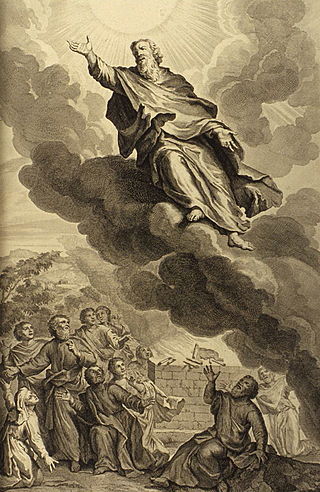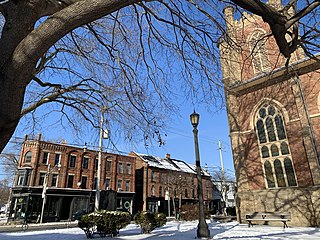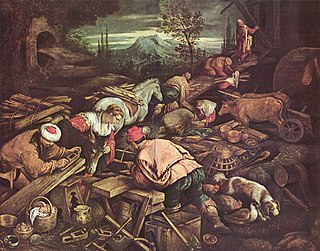The Epistle of Jude is the penultimate book of the New Testament as well as the Christian Bible. It is traditionally attributed to Jude, brother of James the Just, and thus possibly a brother of Jesus as well.
A lost literary work is a document, literary work, or piece of multimedia produced some time in the past, of which no surviving copies are known to exist. It can be known only through reference. This term most commonly applies to works from the classical world, although it is increasingly used in relation to modern works. A work may be lost to history through the destruction of an original manuscript and all later copies.

Enoch is a biblical figure and patriarch prior to Noah's flood, and the son of Jared and father of Methuselah. He was of the Antediluvian period in the Hebrew Bible.
The Apocalypse of Baruch are two different Jewish pseudepigraphical texts written in the late 1st/early 2nd century AD/CE, after the fall of Jerusalem to the Romans in 70 AD, though attributed to Baruch ben Neriah.

Fallen angels are angels who were expelled from heaven. The literal term "fallen angel" does not appear in any Abrahamic religious texts, but is used to describe angels cast out of heaven or angels who sinned. Such angels often tempt humans to sin.

The Book of Enoch is an ancient Hebrew apocalyptic religious text, ascribed by tradition to the patriarch Enoch who was the father of Methuselah and the great-grandfather of Noah. The Book of Enoch contains unique material on the origins of demons and Nephilim, why some angels fell from heaven, an explanation of why the Genesis flood was morally necessary, and a prophetic exposition of the thousand-year reign of the Messiah. Three books are traditionally attributed to Enoch, including the distinct works 2 Enoch and 3 Enoch. None of the three books are considered to be canonical scripture by the majority of Jewish or Christian church bodies.

Pseudepigrapha are falsely attributed works, texts whose claimed author is not the true author, or a work whose real author attributed it to a figure of the past. The name of the author to whom the work is falsely attributed is often prefixed with the particle "pseudo-", such as for example "pseudo-Aristotle" or "pseudo-Dionysius": these terms refer to the anonymous authors of works falsely attributed to Aristotle and Dionysius the Areopagite, respectively.
Sariel is a virtue, mainly from Judaic tradition. Other possible versions of his name are Suriel, Suriyel, Seriel, Sauriel, Saraqael, Sarakiel, Suruel, Surufel, and Souriel.

Corktown is an older residential neighbourhood in downtown Toronto, Ontario, Canada. The neighbourhood is south of Shuter Street, north of the Gardiner Expressway, east of Parliament Street, and west of Don River to the east. Corktown contains many vacated industrial buildings, some now used for movie production, and others repurposed for studios and shops. The West Don Lands development is in the south-east corner of this area.

A Watcher is a type of biblical angel. The word occurs in both plural and singular forms in the Book of Daniel, where reference is made to the holiness of the beings. The apocryphal Books of Enoch refer to both good and bad Watchers, with a primary focus on the rebellious ones.
The genealogies of Genesis provide the framework around which the Book of Genesis is structured. Beginning with Adam, genealogical material in Genesis 4, 5, 10, 11, 22, 25, 29–30, 35–36, and 46 moves the narrative forward from the creation to the beginnings of the Israelites' existence as a people.

The Book of Giants is an apocryphal Jewish book which expands upon the Genesis narrative of the Hebrew Bible, in a similar manner to the Book of Enoch. Together with this latter work, the Book of Giants "stands as an attempt to explain how it was that wickedness had become so widespread and muscular before the flood; in so doing, it also supplies the reason why God was more than justified in sending that flood." The text's composition has been dated to before the 2nd century BC.
The Second Book of Enoch is a pseudepigraphic text in the apocalyptic genre. It describes the ascent of the patriarch Enoch, ancestor of Noah, through ten heavens of an Earth-centered cosmos. The Slavonic edition and translation of 2 Enoch is of Christian origin in the 8th century but is based on an earlier work. 2 Enoch is distinct from the Book of Enoch, known as 1 Enoch, and there is also an unrelated 3 Enoch, although none of the three books are considered canonical scripture by the majority of Jewish or Christian bodies. The numbering of these texts has been applied by scholars to distinguish each from the others.
Enoch is a biblical figure and the subject of the Book of Enoch.

The wives aboard Noah's Ark were part of the family that survived the Deluge in the biblical Genesis flood narrative from the Bible. These wives are the wife of Noah, and the wives of each of his three sons. Although the Bible only notes the existence of these women, there are extra-biblical mentions regarding them and their names.
The Third Book of Enoch is a Biblical apocryphal book in Hebrew. 3 Enoch purports to have been written in the 2nd century, but its origins can only be traced to the 5th century. Other names for 3 Enoch include The Book of the Palaces, The Book of Rabbi Ishmael the High Priest and The Revelation of Metatron.

Against Heresies, sometimes referred to by its Latin title Adversus Haereses, is a work of Christian theology written in Greek about the year 180 by Irenaeus, the bishop of Lugdunum.

The Genesis Apocryphon (1Q20), also called the Tales of the Patriarchs or the Apocalypse of Lamech and labeled 1QapGen, is one of the original seven Dead Sea Scrolls discovered in 1946 by Bedouin shepherds in Cave 1 near Qumran, a small settlement in the northwest corner of the Dead Sea. Composed in Aramaic, it consists of four sheets of leather. Furthermore, it is the least well-preserved document of the original seven. The document records a pseudepigraphal conversation between the biblical figure Lamech, son of Methuselah, and his son, Noah, as well as first and third person narratives associated with Abraham. It is one of the nonbiblical texts found at Qumran. A range of compositional dates for the work have been suggested from the 3rd century BC to 1st century AD. Palaeography and Carbon-14 dating were used to identify the age of the documents. It is 13 inches in length and 2.75 inches in width at its widest point in the middle.
Ethiopian literature dates from Ancient Ethiopian literature up until modern Ethiopian literature. Ancient Ethiopian literature starts with Axumite texts written in the Geʽez language using the Geʽez script, indigenous to both Ethiopia and Eritrea.
The Book of Enoch, is an ancient Jewish religious work, ascribed by tradition and internal attestation to Enoch, the great-grandfather of Noah. 1 Enoch holds material unique to it, such as the origins of supernatural demons and giants, why some angels fell from heaven, details explaining why the Great Flood was morally necessary, and an introduction of the thousand-year reign of the Messiah. The unique material makes it possible to identify which ancient literary works adopt 1 Enoch as a source. Well known in antiquity, the book was received by various authors with respect, and sometimes considered as divinely inspired.









